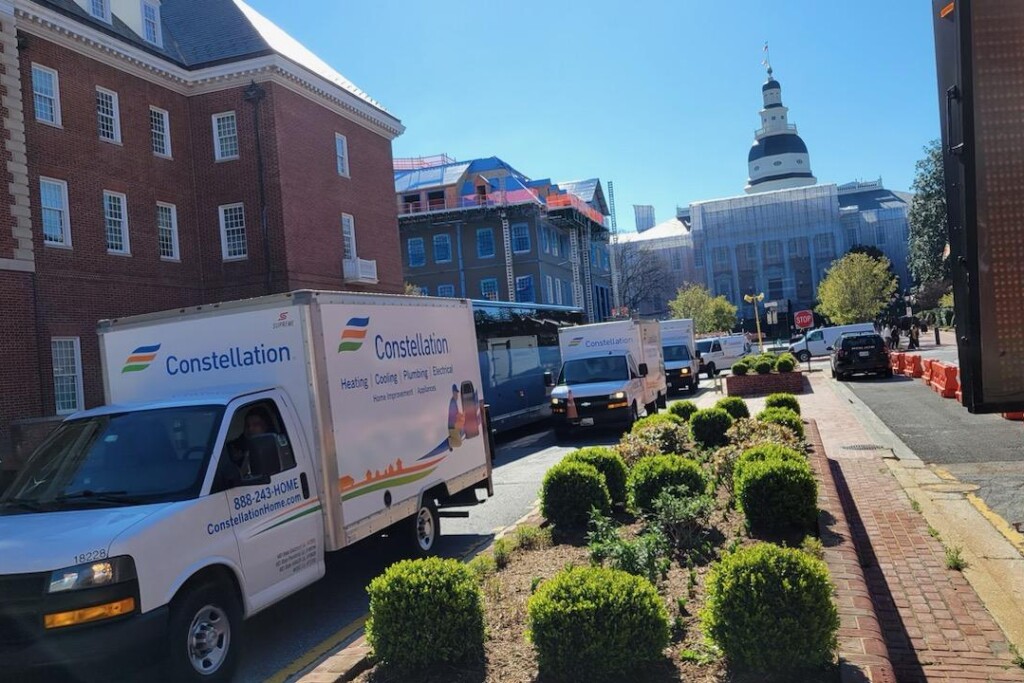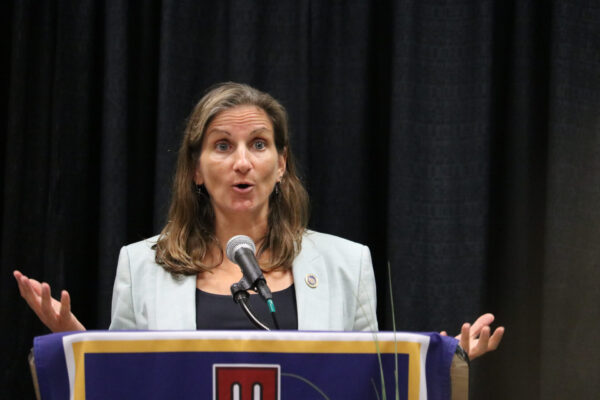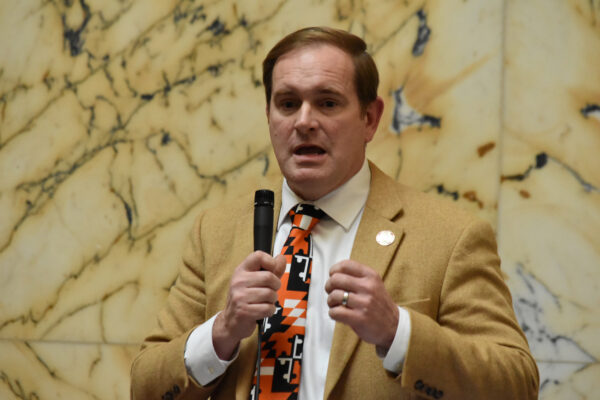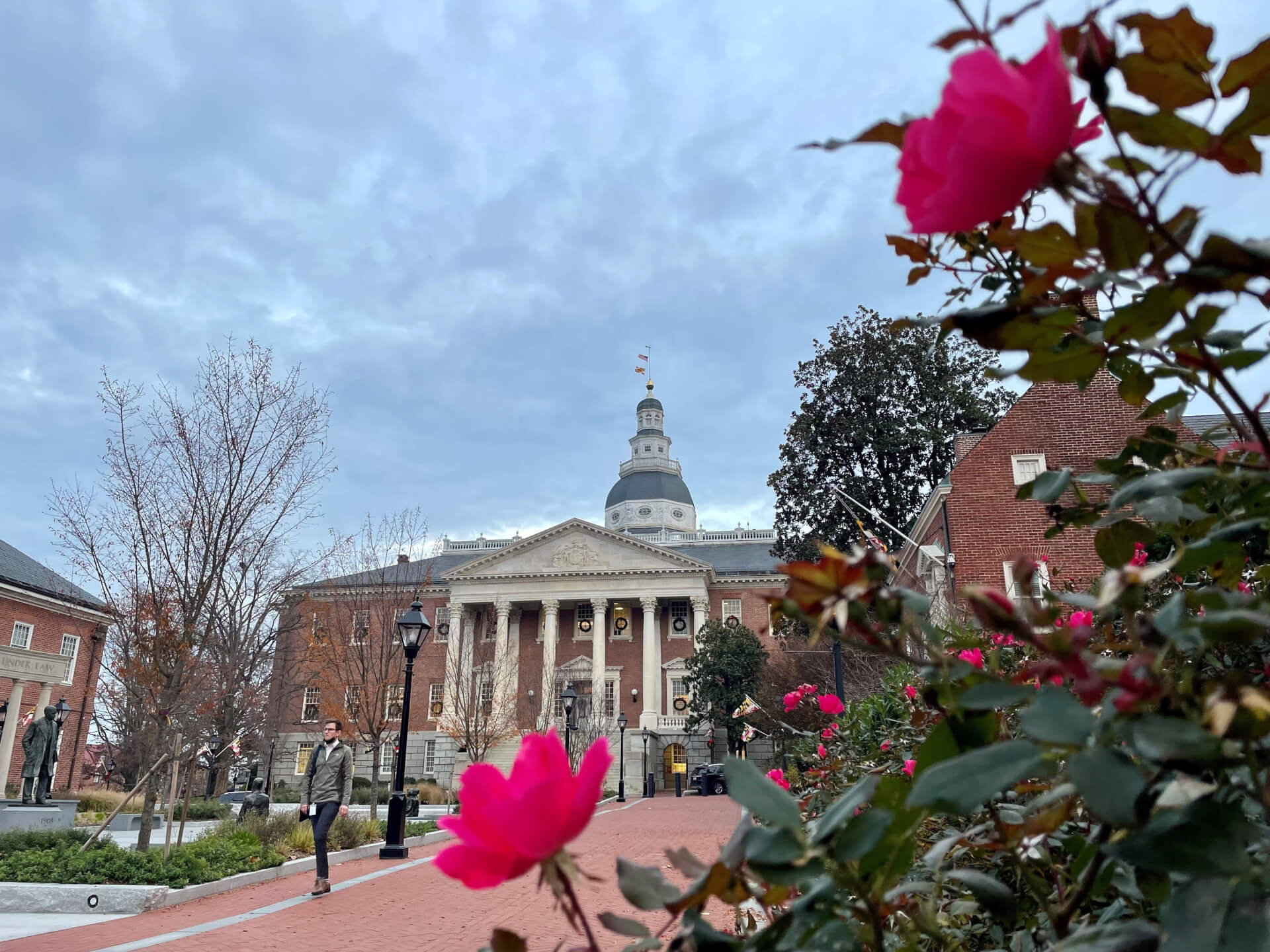The strange journey of Senate Bill 1

As state lawmakers move closer to passing new guardrails on the state’s retail electricity marketplace, an opposition army arrived on Friday.
The energy giant Constellation sent two dozen trucks to Annapolis, which circled the legislative complex all morning as a few dozen Constellation workers fanned out to urge lawmakers to vote against Senate Bill 1. The measure would strengthen consumer protections against deceptive practices in the state’s unregulated retail electricity market.
“Senate Bill 1 (SB 1) not only puts Constellation Home and 1,000 Maryland jobs at risk, it will send a chilling message to Maryland’s business community at a time when jumpstarting the state’s lagging economy should be legislators’ top priority,” read a flier that the workers were distributing.
Constellation is hardly the only big energy company opposing the legislation, which is sponsored by Senate President Pro Tem Malcolm Augustine (D-Prince George’s) and House Economic Matters Committee Vice Chair Brian M. Crosby (D-St. Mary’s). The bill has been one of the most heavily lobbied in Annapolis this legislative session, with powerful interests exerting their pressure, largely behind the scenes.
Even so, the measure has broad support in the legislature, at least among the Democrats, who possess supermajorities in each legislative chamber. The Senate version of the bill passed 33-14 on March 8. The House version passed 99-39 on March 29.
So why is the legislation teetering as the legislature enters the final day of its session Monday? Because the House and Senate have different versions of the bill, which must be reconciled in the next several hours.

House Economic Matters Vice Chair Brian Crosby (D-St. Mary’s). Photo by Bryan P. Sears.
Utility regulation is almost always complex, so very few people truly understand it. And while the bill’s proponents have successfully spotlighted the unscrupulous actors in the electricity marketplace, who prey on poor communities and elderly residents with offers of bargain electric power that are usually too good to be true, it’s hard for the legislation’s opponents to really paint a picture, beyond talking about economic concepts like the erosion of consumer choice and market competition.
Which explains the trucks circling downtown Annapolis Friday, providing an arresting visual.
“In addition to effectively ending residential energy choice in Maryland, SB1 threatens Constellation Home and puts about 1,000 good-paying jobs at risk,” the company said in a statement provided to Maryland Matters Friday. “Constellation’s residential energy business is integrated with Constellation Home, which serves more than 225,000 Marylanders, and our leadership will have to make tough decisions about the future of the business if SB1 dismantles the residential market.”
That’s a threat Maryland leaders do not take lightly.
Constellation’s corporate headquarters are in Harbor East in Baltimore. And that just happens to be the district of Senate President Bill Ferguson (D-Baltimore City).
But Constellation workers were also in Annapolis Friday to protest a controversial amendment that the House Economic Matters Committee had attached to the legislation. That amendment deals with the complicated topic of onsite electricity generation and how electric suppliers interact with their largest commercial customers. But effectively, it would prevent Constellation from building a data center on the property where its Calvert Cliffs nuclear power plant is in Southern Maryland.
Calvert Cliffs generates about 39% of all electricity produced in Maryland, and a far higher share of the carbon-free energy generated here, more than 80%. Nuclear advocates, including Constellation, would love for state policymakers to put nuclear in the same tier of renewable energy as solar, wind and geothermal — making nuclear producers eligible for various state-sanctioned financial benefits.
But that’s not what the House amendment to the consumer protection bill is about. Data centers are energy-intensive facilities that get their power from regional electric power grids. The data centers pay for the privilege, and ratepayers indirectly reap the benefits.
If a data center opened on Calvert Cliffs’ property, House lawmakers have argued, it would take its energy directly from the nuclear plant and would not be paying for the privilege of getting its power from PJM, the regional grid. It could also wind up taking a significant percentage of energy that Calvert Cliffs is currently delivering to PJM.

Del. Lorig Charkoudian (D-Montgomery) speaks at the Maryland Association of Counties annual conference in 2019. Photo by Danielle E. Gaines.
“The impact of putting a data center behind the wall at Calvert Cliffs is essentially like taking Calvert Cliffs off the grid,” Del. Lorig Charkoudian (D-Montgomery) told her colleagues on the Economic Matters Committee on Saturday. She added the amendment is necessary because putting a data center near an energy-generating facility like Calvert Cliffs “is a sneaky way for data centers to get around paying for the energy they get from the grid.”
Crosby, the committee vice chair, has estimated that not passing the amendment and taking some of Calvert Cliff’s off the grid to feed a data center could eventually have a $4 billion impact for ratepayers.
Several stakeholders have complained that by adding the amendment to SB 1, the House was rushing a complicated issue, without proper public input, that on its own could have resulted in complex legislation. But in an interview, Economic Matters Chair C.T. Wilson (D-Charles), defended moving the amendment late in the legislative session, arguing that lawmakers weren’t fully aware of the potential problem when they first began debating the consumer protection bill.
“It didn’t pop up right away,” he said.
Charkoudian asserted that the amendment the House attached to SB 1 “would allow for more reliability” for electric customers, and said waiting for a year to tackle the issue addressed in the House amendment, as some lawmakers have suggested, might be inadvisable, if Constellation moves quickly to accommodate a data center at Calvert Cliffs.
“By the time we get to a year from now it may be late to address the consequences,” she said.
In its statement to Maryland Matters, Constellation, which operates the only nuclear plant in the state, suggested the debate over the amendment should be seen in the broader context over the future of nuclear energy.
“Our nuclear facilities are carbon-free clean energy centers that can power decarbonization of other industries and enable investments to drive economic development,” the company said. “The proposed amendment to SB 1 would effectively block customers from making such investments at a nuclear plant, including things like clean hydrogen production, direct air capture technology or data centers that power the internet and drive global commerce.
“Co-locating these types of projects next to a nuclear plant lowers costs by avoiding transmission upgrades that would otherwise be paid for by utility customers, and it ensures these technologies are powered with reliable clean energy. If adopted, the amendment would drive billions of dollars in economic development and tax revenue away from Maryland to neighboring states.”
‘Shoved across the street’
The Senate Committee on Education, Energy and the Environment, which debated and passed SB 1 early in the session, got the amended of the version of the bill back from the House on March 29. There was some thought among utility lobbyists and other stakeholders that the committee might embrace the amended bill and move it back to the Senate floor fairly quickly.
But in the end, the Senate panel did not take up the legislation again until Friday morning, and senators concluded that they could not tackle such a complex amendment in such a short period of time.
The House “dropped a pretty significant amendment on to alter the bill in many respects,” Sen. Brian J. Feldman (D-Montgomery), the committee chair, told his colleagues.
Augustine quickly moved not to concur with the House version of the bill, and his colleagues unanimously agreed.
“To me, this should have been its own piece of legislation and gone through the entire legislative process and not just be shoved across the street like that,” said Sen. Jason C. Gallion (R-Harford and Cecil).

Sen. Jason C. Gallion (R-Harford and Cecil). Photo by Bryan P. Sears).
Later Friday, the Senate approved a conference committee on SB 1 to meet with the House, chaired by Augustine and featuring Feldman and Gallion.
In an interview late Friday, Augustine expressed confidence that SB 1 would eventually pass in its original form, because most of the legislature supports the underlying mission of tightening the unregulated electricity marketplace.
“Most of us are just committed to SB 1 getting out, the consumer protection [provisions],” he said. “That’s the heart of the bill.”
On Saturday afternoon, after the House held its floor session, Economic Matters met to discuss what to do with the bill. Wilson, the chair, hinted that powerful forces, including Senate President Ferguson, were watching closely and didn’t want to make a move that would upset Constellation too greatly.
“We could appoint a conference committee,” he told the committee. “I don’t know what the outcome is going to be. But I’m sure I’d be told.”
So the committee voted not to recede from its position. The House will presumably appoint a conference committee on Monday. And then delegates and senators will work toward a solution. But Wilson warned his colleagues that they might still have to stand down.
“I don’t know what wiggle room we have,” Wilson conceded in an interview.
Anything can happen with a bill that goes to a conference committee on the final day of the 90-day session, even one with widespread support like Senate Bill 1, with its readily apparent consumer protections. Crosby’s wife gave birth to a baby girl on Saturday morning, so it isn’t clear whether one of the House’s biggest experts on utility legislation will be in Annapolis Monday to be part of the conversation.
Observed Del. Adrian Boafo (D-Prince George’s), a member of the Economic Matters Committee: “Every single day it gets more interesting with this bill.”




 Creative Commons Attribution
Creative Commons Attribution